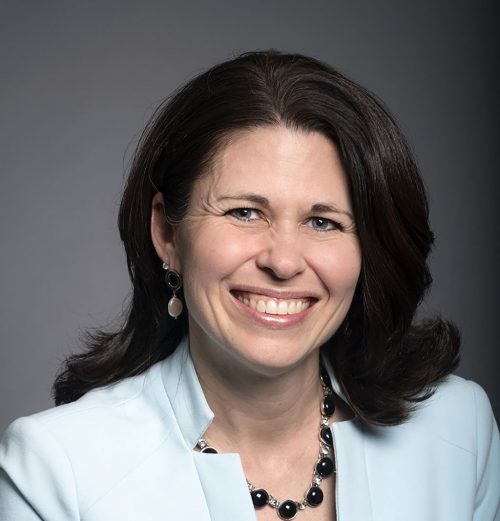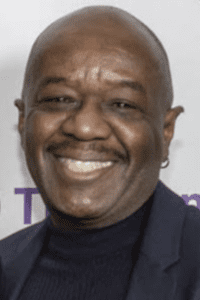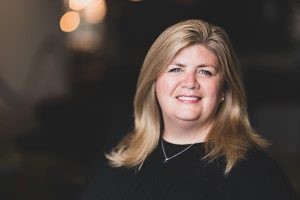
5 Questions with Amy Adams, Executive Director of the Institute for Biohealth Innovation at George Mason University
“5 Questions With…” is a weekly BioBuzz series where we reach out to interesting people in the BioHealth Capital Region to share a little about themselves, their work, and maybe something completely unrelated. This edition features 5 Questions with Amy Adams, Executive Director of the Institute for Biohealth Innovation at George Mason University.
As Executive Director of the Institute for Biohealth Innovation at George Mason University, Amy Adams is responsible for nurturing and advancing biohealth research and innovation interests of more than 250 faculty and thousands of students who represent a broad range of academic disciplines. Her role includes fostering partnerships with industry, healthcare, government, and academic partners.
Prior to leading the development of the Institute for Biohealth Innovation in 2017, she served in several different capacities at Mason. As a scientific researcher, she used genomic and proteomic technologies to study signaling pathway networks in cancer. Amy also led outreach efforts and created programs including the Aspiring Scientists Summer Internship Program and the Galileo’s Science Café to engage high school and undergraduate students in research across STEM disciplines, communicate science to the public, and foster internal and external collaborations. Her journey began at Mason where she earned a M.S. in Chemistry, B.S. in Biology.
1. Your Education AND Career has been with George Mason. Tell about your current role and what love most about George Mason.
As you noted, I have been at Mason for quite some time, and I feel truly blessed to support so many talented faculty, staff, and students who are tirelessly working to answer some of biohealth’s biggest challenges. It is really exciting to have a pulse on what is happening across the university in 32 academic disciplines and rewarding to foster connections that will help them and their collaborators solve complex problems. My team offers a variety of services to elevate research, spanning from resources and connections to support research development, to providing administrative and operational management support for core facilities including our 3T MRI lab, which is available to both internal and external users.
As the thread that stitches together all biohealth research at Mason, the Institute for Biohealth Innovation shares our comprehensive biohealth story with the world. As a young Tier 1 research institution, folks are often surprised and intrigued to hear about the incredibly innovative, community embedded research that is happening at the university. My team and I share Mason’s stories with others at conferences, on social media (@MasonBiohealth), in the news, and with the many individuals we have the pleasure to meet each day.
One of the strategic priorities of the Institute for Biohealth Innovation is to work with partners like Biohealth Innovation, Virginia Bio, and other stakeholders to foster growth of the state and regional bioeconomy. This is something that I am very passionate about. This region is a gem with federal agencies like the FDA, NIH, DOD, and NSF in our backyard; reasonable rates for wet lab space compared to other life science clusters including Boston and Silicon Valley; award-winning health care systems; successful, innovative companies; and esteemed academic institutions graduating a highly skilled workforce and conducting cutting-edge research. Locally, we have seen tremendous investment in the life sciences by the Prince William County Department of Economic Development. The PW Science Accelerator offers bench space for start-up companies and their newest investment in the Northern Virginia Bioscience Center, a planned 30,000 square foot lab building is expected to open in fall 2021. This has provided a location for our start-ups like Ceres Nanosciences to rent space and graduate into larger lab facilities adjacent Mason’s SciTech Campus, as well as cultivated partnerships with the other resident companies.
What I love most about Mason is the collaborative and innovative spirit of the institution. This resonates throughout the entire university with our faculty, staff, and students who conduct research to our leaders who develop new programs. As a relatively young institution, we are nimble and can quickly develop new programs and initiatives that we think will make a significant change. For example, we recently launched a Military, Veterans, and Family Initiative to give back to those who give their all to our nation. In addition to education and direct services for this important population of our community, we also have investigators like Dr. Siddhartha Sikdar who are conducting translational research to enhance the quality of life for our service members, veterans, and their families. Dr. Siddhartha Sikdar and his team have patented a prosthetic control system for a more robust, intuitive, and dexterous control of prosthetics.
2. What are some of the programs happening right now at The Institute for Biohealth Innovation (IBI)?
Our portfolio is very large spanning from brain and behavior and cancer to digital health and informatics, and beyond. Given that infectious diseases are on the forefront of our minds, I would be remiss if I did not mention some of the resources and research we have at the university in this space. Mason is home to one of 13 regional biocontainment laboratories led by the National Center for Biodefense and Infectious Diseases, which gives us the capacity to study COVID-19 and other emerging infectious diseases. We also have a CAP CLIA certified laboratory led by our Center for Applied Proteomics and Molecular Medicine, where we can collect clinical trial experiment data that can be reported to the FDA. Teams in both facilities have been working around the clock during the pandemic to develop new diagnostics, vaccines, and therapeutics for COVID-19, TB, and other diseases. We have many investigators partnering with other institutions and companies around the world to deliver new solutions to combat the diseases.
Mason and Partners (MAP) Clinics, which are located across Northern Virginia, are providing care to some of our most vulnerable populations, including uninsured, low-income populations, and people experiencing homelessness. The MAP Clinic in Manassas Park is providing free COVID-19 testing. In line with Manassas City being designated by the CDC as a COVID-19 hot spot in June, the team reported as high as an 81% positivity rate and have to date administered over 600 tests. In addition to screening for COVID-19, the nurse practitioners and students are helping their patients battle chronic conditions, treat substance use disorders, and address behavioral health issues such as anxiety and stress. Our other public health experts at Mason are also working on strategies to continue to safely reopen the economy, as well as developing algorithms to distinguish between flu and COVID-19.
Several investigators in the Center for Adaptive Systems of Brain Body Interactions (CASBBI) are working to combat substance disorders, which public health officials are reporting are on the rise as the pandemic persists. Dr. Holly Matto and Dr. Padhu Seshaiyer were recently awarded an NIH STTR award, in partnership with Brightline Interactive, LLC, to develop virtual reality tools to enhance evidence-based treatment of substance use disorders. The CASBBI team is also leveraging their NSF NRT grant to train a versatile, interdisciplinary, community-engaged STEM workforce who will have the skills necessary to harness the data revolution in the life sciences.
3. How do you see The Institute for Biohealth Innovation (IBI) and other academic based institutions fitting in with the Corporate and Government parts of the BioHealth Capital Region?
The Institute for Biohealth Innovation, as well as the other stellar academic institutions in Virginia, DC, and Maryland, can help to drive new research and innovation in our region by partnering with the federal labs and companies. Our diverse and talented teams of faculty, staff, and students can help to explore answers to the government’s unmet needs, and work with companies to develop new innovations. Another feature of academic institutions is that we have core facilities, some of which are available to external entities. For example, at Mason we have a 3T MRI facility with a certified MRI technician, a NexGen sequencing laboratory, and a CAP CLIA laboratory, to name a few.
One of the challenges companies sometimes face when trying to find an academic partner is who to contact in such a large institution. This is one of the reasons we established the Institute for Biohealth Innovation. Serving as a concierge, we can personally introduce potential collaborators with faculty who have aligned expertise. We also serve to bring our faculty together with federal labs and healthcare systems to identify their unmet needs, share our expertise, and identify synergies for a productive collaboration.
4. What are some of the biggest gaps you see in the region, and how would you address them?
One of the biggest gaps I see in the region is the absence of a cohesive picture of our collective biohealth assets across Virginia, Washington D.C., and Maryland. Biohealth Innovation has made big strides to begin addressing this opportunity. We have so much richness in our region, and I think we could benefit from having a single location to learn about everything the region has to offer. In my opinion, this would facilitate new partnerships, create increased opportunities for shared access to equipment and infrastructure, and further support cross-fertilization of ideas. In turn, this clearinghouse of information would have the potential to attract talent to our region and heighten awareness by VC and angel investors.
Another catalyst for growing our region would be seed funding for regional collaborations. Virginia, Washington D.C., and Maryland all have committed seed funding and established programs to increase commercialization output. Coming together as a region can only amplify the impacts of such investments. The region’s efforts to attract Amazon serves as an excellent example.
5. If you had to be shipwrecked on a deserted island, but all your human needs were taken care of, what two items would you want to have with you?
The two things I would want to have with me are a hiking backpack to explore the island, which will hopefully have some beautiful waterfalls, and a fishing pole. My children and I love nature, with some of our fondest vacation memories being those at the state park without the distractions of TV, internet, and common luxuries.
We love spending time in the outdoors hiking, seeing new critters, finding the best hiking stick, and spending countless hours swimming and fishing. Most of these vacations, I spend the entire week cooking over an open fire. While I might not have the ribeye or wood fired pizza on the deserted island, the fish I would catch with the pole sure would be tasty cooked over an open fire on the beach.
Thank you to Amy Adams participating in the ‘5 Questions with BioBuzz’ series and stay tuned for more interviews with others from across the BioHealth Capital Region and beyond.



